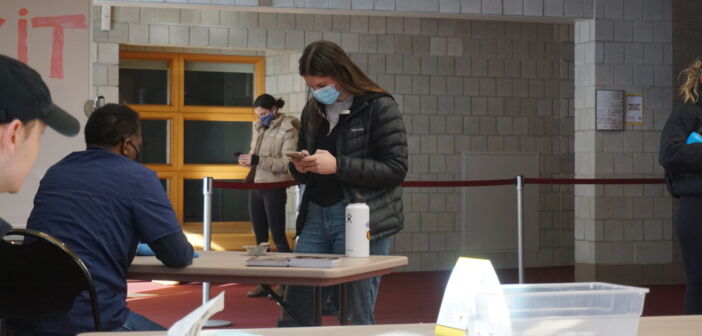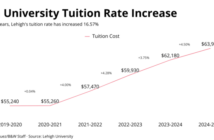In a sharp increase from the fall semester, Lehigh has spent the first three weeks of the spring semester working to test 100 percent of the student body, both on and off campus, on a weekly basis.
In an email, David Rubenstein, executive director of the Health and Wellness Center, said during the fall semester, Lehigh tested roughly 10 percent of students, and then increased testing to 20 percent in mid-October due to an increased positivity rate.
“This spring semester, we continued with pre-arrival testing again, and then increased our surveillance testing to include almost all students each week over the course of the first two weeks, followed by 50 percent of students weekly, thereafter,” Rubenstein said.
Because of a positivity rate reaching roughly 10 percent for surveillance tests, Lehigh is continuing to administer tests to all students this week, despite the initial plan of testing 50 percent starting the third week of the semester.
“The (COVID-19 Response Team) will continue to monitor positivity levels in making decisions regarding future changes to testing levels,” Rubenstein said in an email.
According to the university’s COVID-19 dashboard, Lehigh has administered 10,547 surveillance tests between the first day of the spring semester and Feb.17.
Provost Nathan Urban said each COVID-19 test costs Lehigh between $80 and $140. The total cost since the winter has surpassed $1 million, and as high rates of positivity still occur, tests remain a critical expense for the ongoing health of students, Urban said.
Another factor increasing the number of tests being administered is the changes in housing options offered to students.
“Lehigh offered housing to all the sophomores who told us they were living at home in the fall,” Urban said. “And then all the freshmen who elected to not be on campus in the fall.”
With more students living on campus, there have been more tests administered.
In the last few days, the surveillance test positivity rate has decreased from 10 percent to under 4 percent. Although this is an improvement, it remains significantly higher than the 2 percent seen throughout most of the fall semester.
In an email, Lehigh Director of Media Relations Lori Friedman explained potential reasons for the increased positivity rate. She said reasons include a higher concentration of the virus nationally and in Bethlehem, increased surveillance testing, the existence of more transmissible variants, and a certain degree of complacency about maintaining healthy practices.
“The off campus social scene is absolutely more active—and dangerous—than in the fall semester, based on the reports we have received in the past weeks,” said Dean of Students Katherine Lavinder, in an email.
Many students believe weekly testing is a better strategy than the more sporadic testing approach from last semester.
“Personally, I like that they’re doing (testing) every week,” said Brianna Snavely, ‘24, who lives on campus this semester. “Last semester, they made a lot of mistakes which ended with campus shutting down.”
Jake Hunter, ‘24, who also lives on campus, also appreciates the increase in testing.
“(I) Don’t mind it, because I don’t want to be quarantined,” Hunter said. “It’s a minor inconvenience, but I’d rather have that than being quarantined all the time.”
Hunter said that he believes Lehigh is doing better than it did last semester to provide students living in the area with clear communication regarding when and where they should receive testing.
Lehigh’s spring semester testing schedule has already seen unforeseen alterations. The unanticipated positivity rate forecasts a continued need for increased testing, subsequently creating an increased cost for the university.






Comment policy
Comments posted to The Brown and White website are reviewed by a moderator before being approved. Incendiary speech or harassing language, including comments targeted at individuals, may be deemed unacceptable and not published. Spam and other soliciting will also be declined.
The Brown and White also reserves the right to not publish entirely anonymous comments.